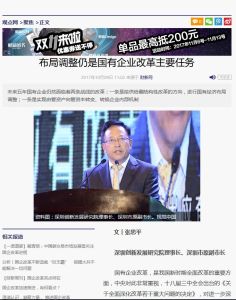Join getAbstract to access the summary!

Join getAbstract to access the summary!
Siping Zhang
How China Should Go About Restructuring Its State-Owned Enterprises
Caijing Magazine, 2017
What's inside?
How can China’s state-owned enterprises survive in their new economic environment? And should they?
Recommendation
The Chinese government has released dozens of plans to back state-owned enterprise (SOE) reforms since the 3rd Plenary Session of the 18th Central Committee of the Communist Party of China in 2013, but four years later, the reforms remain difficult to implement and far from achieving their desired outcomes. Siping Zhang, the Chairman of Shenzhen Innovation and Development Institute, identifies SOEs that still need major structural reforms and proposes strategies to allow underperforming organizations to gradually exit the market. getAbstract recommends this article to those curious about crucial issues involved in China’s SOE reform progress.
Summary
About the Author
Siping Zhang is chairman of Shenzhen Innovation and Development Institute and former deputy mayor of Shenzhen, China.




















Comment on this summary